I Dig Sports
Braves' Culberson has multiple facial fractures
Published in
Baseball
Sunday, 15 September 2019 10:43
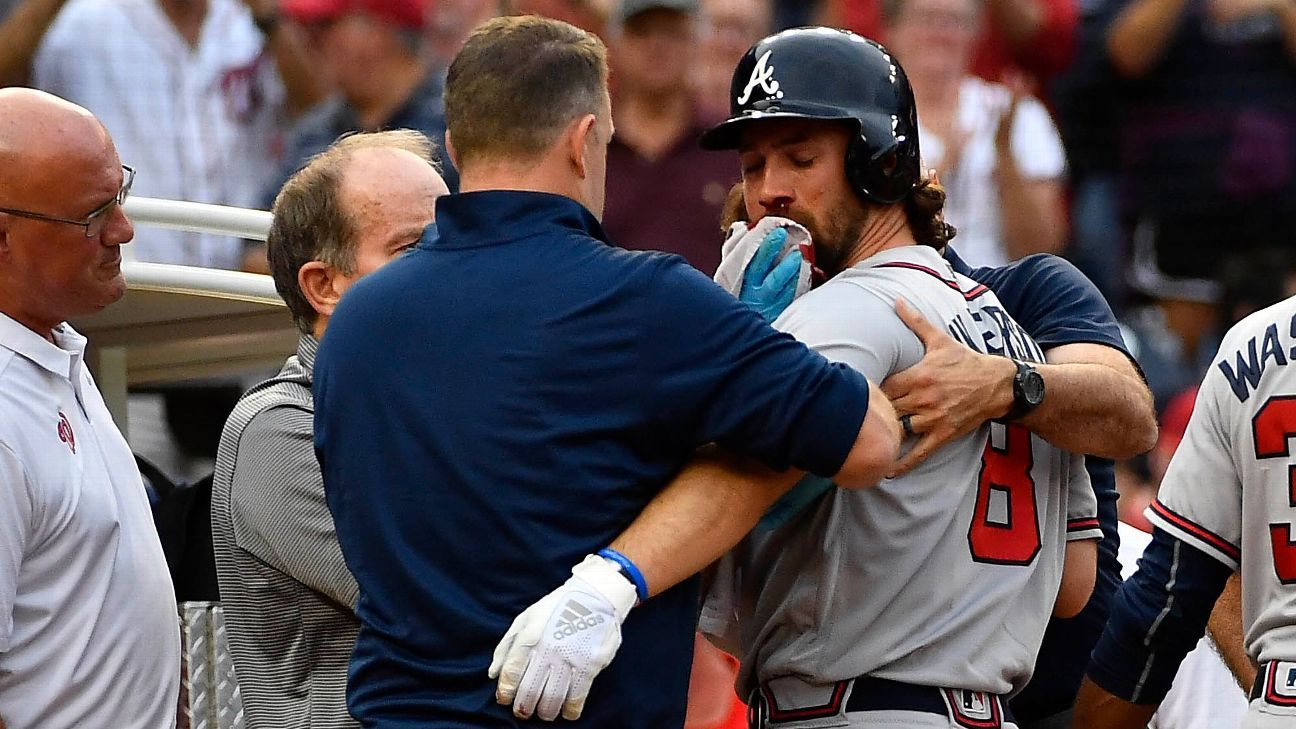
Atlanta Braves utility man Charlie Culberson suffered multiple facial fractures after being hit on the right cheekbone by a 91 mph fastball on Saturday, the team announced Sunday.
Culberson has been cleared to travel from Washington to Atlanta, where he will meet Sunday with the team's doctors to determine the next steps in his treatment, the team said.
Culberson was pinch hitting for starting pitcher Mike Foltynewicz with two on and no out in the seventh of a 1-1 game Saturday when he was hit on the first pitch thrown by Washington Nationals reliever Fernando Rodney.
The Braves won Saturday's game 10-1 to clinch a playoff berth.
Tagged under

Mike Trout has been trying to get back in the lineup, but that plan will be put on hold because the Los Angeles Angels slugger will have surgery on his foot.
The team announced that Trout will have a thickening of tissue around the nerves -- a Morton's neuroma -- in the ball of his right foot removed later this week.
Trout missed his eighth straight game Sunday but has been testing the foot the past few days to see if he could get back on the field. The team said in a statement that he was still experiencing too much pain to play.
Trout, who leads the American League with 45 homers, had an injection of cold fluid in the area of his foot Monday in an attempt to get back on the field.
Tagged under
Pliskova claims fourth WTA title of year at the Zhengzhou Open
Published in
Tennis
Sunday, 15 September 2019 07:46
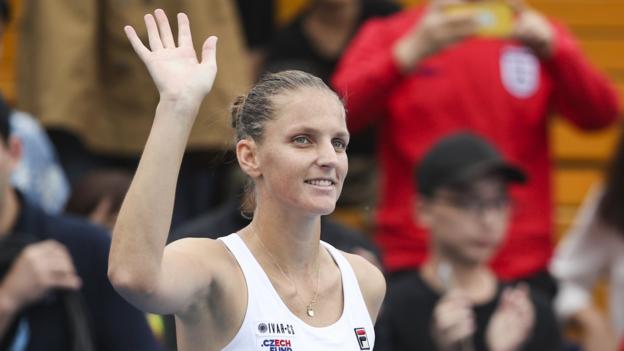
Karolina Pliskova swept past Petra Martic in straight sets to win the WTA Zhengzhou Open in China.
Pliskova only needed 77 minutes to beat the Croatian 6-3 6-2 in a rain-interrupted final for her fourth tournament success of 2019.
The Czech player, top seed at the event, only dropped one set all week on her way to the title.
Victory in Zhengzhou followed earlier titles in Brisbane, Rome and Eastbourne for the 26-year-old.
The world number two will close the gap on Australia's Ashleigh Barty in the rankings, however she has yet to secure a first Grand Slam title. Her best performance this year was reaching the semi-finals at the Australian Open in January before losing to eventual champion Naomi Osaka.
Tagged under
Aiming for repeat success, first step Helsingborg
Published in
Table Tennis
Sunday, 15 September 2019 07:57

The winners of the respective men’s singles and women’s singles events qualify for the Tokyo 2020 Paralympic Games.
Notably, Borislava Peric-Rankovic, Natalia Partyka and Laurens Devos hold all three major titles at the moment; in addition to succeeding in Rio de Janeiro, they won at the 2017 European Championships and at the 2018 World Championships, both events being held in Lasko, Slovenia.
Applicants to join list
Success in Helsingborg and four more players in the guise of Fabien Lamirault, Peter Rosenmeier, Florian Van Acker and Kelly Van Zon will join the list. All missed out two years ago in Lasko. In the men’s singles event, competing in class 2, Fabien Lamirault was beaten at the quarter-final stage by Slovakia’s Martin Ludrovsky, in the same round in class 6, Peter Rosenmeier suffered at the hands of Romania’s Bobi Simion. Likewise in class 11, one round later, it was defeat for Florian Van Acker when opposing Frenchman Lucas Creange.
Similarly, in the women’s singles event, Kelly van Zon departed in the penultimate round; she was beaten by Turkey’s Kubra Korkut.
Aiming for improvement
Seeking an improvement on two years ago in Lasko, it is the same for a further four players in Helsingborg who in 2018 became world champions.
In the men’s singles events, in class 7 Spain’s Jordi Morales was beaten by Jean-Paul Montanus of the Netherlands in round one. Likewise in class 8, Great Britain’s Ross Wilson experienced a semi-final defeat at the hands of Ukraine’s Viktor Didukh. Meanwhile, in the women’s singles competitions, in class 6 Maryna Lytovchenko departed at the semi-final stage, beaten by Poland’s Katarzyn Marszal; in class 11, Russia’s Elena Prokofeva suffered in the final, she lost to colleague Natalia Kosmina.
Seeking progress
Meanwhile, for Turkey’s Abdullah Ozturk and Great Britain’s Will Bayley, gold medallists at the Rio 2016 Paralympic Games, they will be seeking an improvement on two years ago. At the 2017 European Para Championships, competing in class 4, Abdullah Ozturk was beaten in the final by Frenchman Maxime Thomas; in class 7, Will Bayley experienced a semi-final defeat at the hands of Ukraine’s Mykhaylo Popov.
“I’ve played really well this season. I’m really enjoying my table tennis and I’m a bit more relaxed. It is going to be a tough tournament so I’ll take it one match at a time but I’m playing well and I’m happy with my game. It’s been such a long time since I won the Europeans, it seems like a lifetime ago, and it would be so nice to win it again. I’ve come up short a couple of times and lost in two finals and a semi-final, since I won it, so I’ve had some good runs. It would mean the world to me to go all the way but I’m going there to enjoy it and have fun, I think that is when I play my best table tennis.” Will Bayley
Furthermore, there has been an added preparation to Will Bayley’s training programme; as soon as the European Championships have finished he will appear in his first live performance of Strictly Come Dancing.
“I really think it is going to improve me a lot when I’m playing table tennis, because already I’m becoming more aware of my balance and my movement and I’m getting stronger in my core. When I’m playing table tennis now I’m thinking more about my balance and the way I stand and using my body to help me in my shots. It is helping me understand my body more and that can only help with table tennis.” Will Bayley
Aiming for fourth gold
Seeking to win the European title for the first time since 2011, for colleague Rob Davies, likewise a gold medallist in Rio de Janeiro, he is seeking a fourth consecutive European title.
“I’m happier with the way I’m playing this season but I’ve still got a way to go. It’s nice to pick up a few medals but for me it is all about building for Tokyo now. I’m proud to have won three European titles but I don’t want to think about it too much. I’m just going out there to enjoy it; I play my best when I’m enjoying my table tennis and hopefully the results will take care of themselves. Of course it is special to be going for my fourth; I’m proud of the three I’ve already got and another one would be nice but I’m not putting all my hopes on it.” Rob Davies
Overall, 312 players, 217 men and 95 women will compete in Helsingborg.
2019 ITTF European Para Championships: Latest Draws and Results
Please follow and like us:
Tagged under

SELINSGROVE, Pa. – Logan Wagner led all the way to capture a $20,000 payday in Saturday night’s 37th annual Jim Nace Memorial National Open for 410 sprint cars at Selinsgrove Speedway.
Wagner was never headed and took the checkered flag .755 seconds in front of Freddie Rahmer, who chased him throughout the 40-lap feature at the half-mile dirt oval.
Midwestern invader Brian Brown completed the podium, followed by Kerry Madsen and T.J. Stutts.
Each of the top five finishers held those positions for all 40 laps on Saturday night.
Anthony Macri crossed sixth, ahead of Brian Montieth, Danny Dietrich, Lance Dewease and Steve Buckwalter.
The winner’s share was the largest prize for an unsanctioned sprint car race in Pennsylvania this season, with a guaranteed $600 to start and a total race purse of $50,000.
Garrett Bard won the companion PASS/IMCA 305 sprint car feature, beating Zach Newlin, Keith Prutzman, Devin Adams and Ian Cumens.
The finish:
Logan Wagner, Freddie Rahmer, Brian Brown, Kerry Madsen, T.J. Stutts, Anthony Macri, Brian Montieth, Danny Dietrich, Lance Dewease, Steve Buckwalter, Ryan Smith, Jared Esh, Cody Keller, Blane Heimbach, Lucas Wolfe, Jason Shultz, Landon Myers, A.J. Flick, Dylan Cisney, Kyle Reinhardt, Tyler Reeser, Ryan Linder, Trey Starks, Cory Haas.
Tagged under
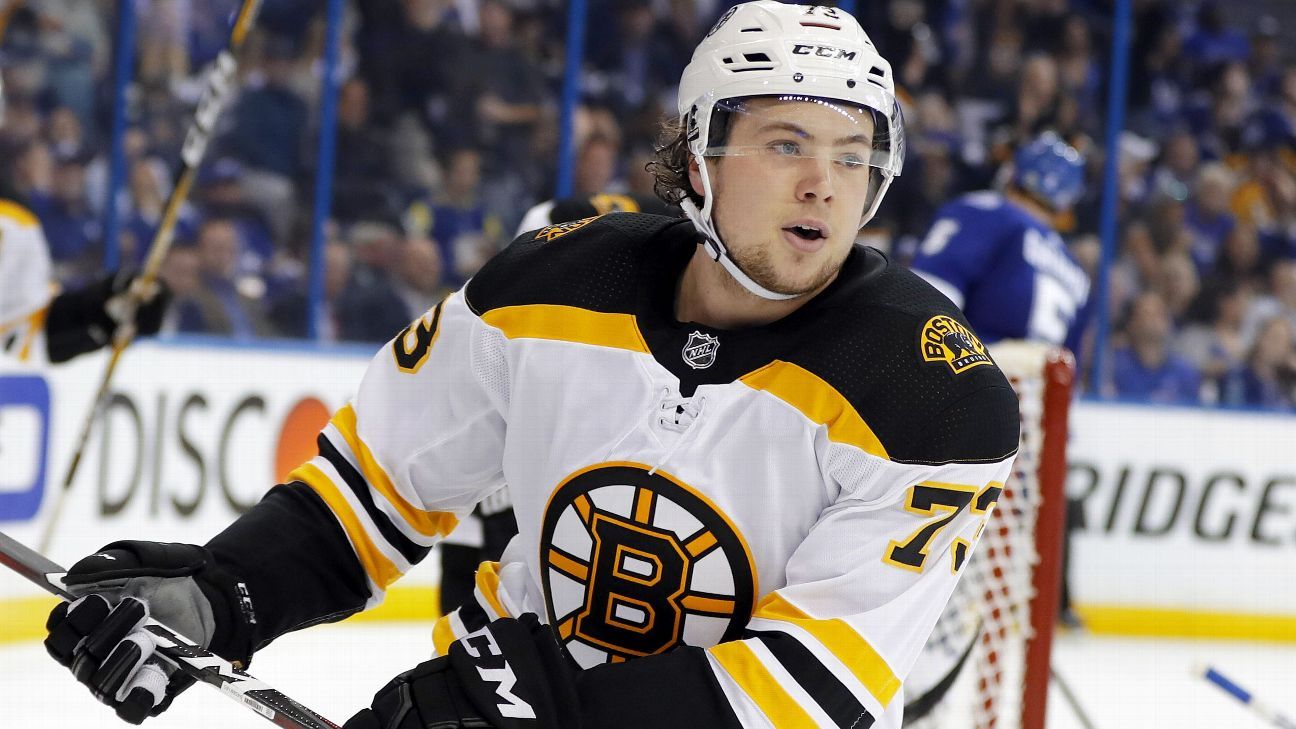
Another top restricted free agent signed with his current team Sunday when defenseman Charlie McAvoy inked a three-year, $14.7 million deal.
Bruins general manager Don Sweeney made the announcement that the 21-year-old would remain with the team, just days after training camp began. The Bruins have their first preseason game Monday night at New Jersey.
The Bruins didn't have much cap room, so the bridge deal for McAvoy makes sense for both sides. Boston still has to reach agreement with fellow restricted free-agent defenseman Brandon Carlo and has about $3 million left.
The Bruins thought so much of McAvoy when they signed him in April 2017 out of Boston University that they had the 19-year-old make his NHL debut in the playoffs. He held his own there and has developed into a potential No. 1 defenseman.
Paired mostly with captain Zdeno Chara, McAvoy had seven goals and 21 assists last season. He had seven goals and 25 assists in his rookie season. He did miss 28 games last season with various injuries, including a concussion. McAvoy's possession numbers are solid at 54.5 Corsi percentage in his two seasons.
In the Bruins' run to the Stanley Cup Final last season McAvoy had eight points in 23 games.
Tagged under
Rain ruins India's home season opener in Dharamsala
Published in
Cricket
Sunday, 15 September 2019 07:53
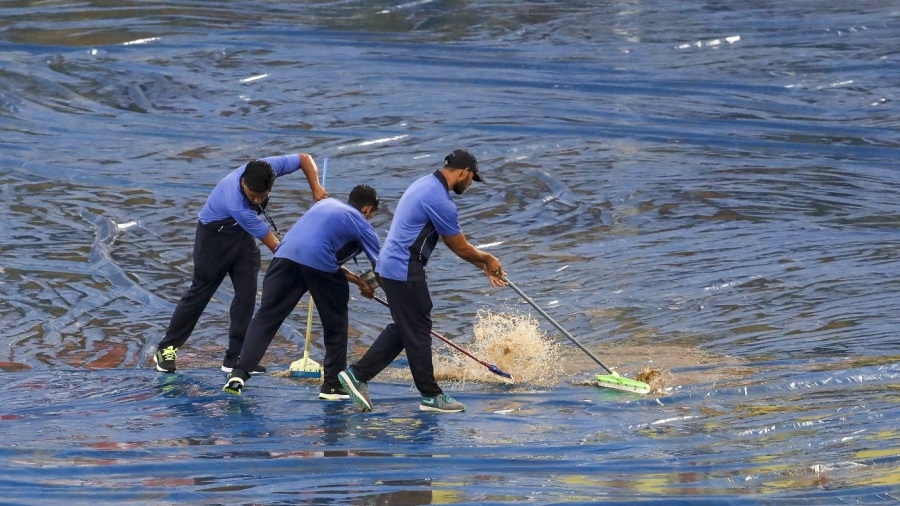
India v South Africa Match abandoned
India's home series opener was ruined by persistent rain as the first T20I against South Africa was abandoned without even the toss taking place in Dharamsala. The entire ground was covered, but rain refused to relent and created massive puddles of water on the covers, resulting in the game to be called off at 7.48pm local time.
Rain had also made an appearance on Saturday afternoon, forcing the pitch to be covered. It had the final say on Sunday as well.
With the first game of the tour washed out, batsman Temba Bavuma, 25-year-old teraway Anrich Nortje and left-arm spin-bowling allrounders Bjorn Fortuin and George Linde will have to wait until the second match at Mohali on Wednesday to make their T20I debuts. Quinton de Kock, too, will have to wait until Wednesday to make his T20I captaincy debut.
The third - and the final game of the T20I series - will be played in Bengaluru on September 22.
Tagged under
Rubio, Gasol lead Spain to 2nd World Cup title
Published in
Breaking News
Sunday, 15 September 2019 08:45
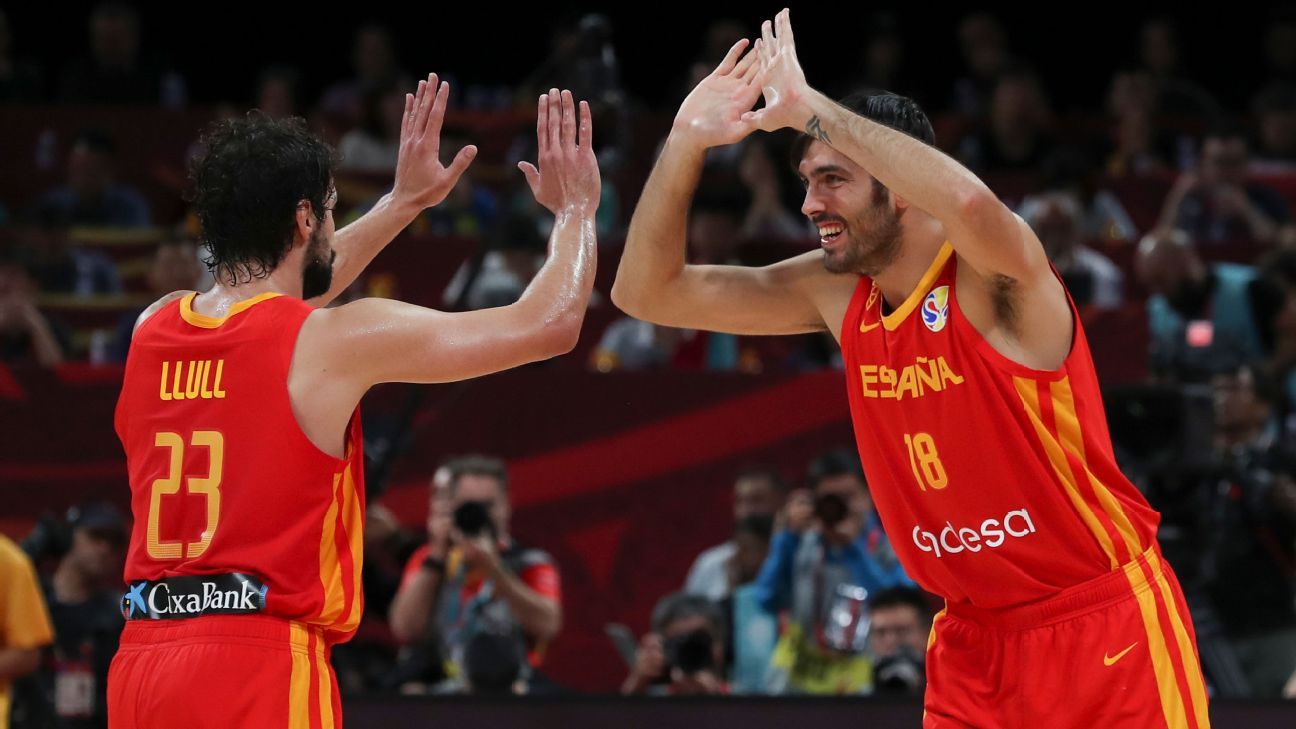
Spain has won its second World Cup championship, defeating Argentina 95-75 on Sunday to give Marc Gasol a rare double-title year.
Tournament MVP Ricky Rubio scored 20 points and Sergio Llull added 15 for Spain (8-0), the ninth team to make it through a World Cup or world championship unbeaten. Gasol scored 14 for the winners, who never trailed.
For Gasol, it was a historic win. The Toronto Raptors center becomes the second player to win an NBA title and a FIBA world gold medal in the same year, joining Lamar Odom, who did it for the Los Angeles Lakers and USA Basketball in 2010.
Gasol is also the 19th player to win either an NBA or WNBA crown along with a gold medal, either of the Olympic or World Cup variety, in the same year. And he's the first to accomplish that feat while representing a nation other than the U.S.
When Spain won its first title in 2006, it was Pau Gasol -- Marc's older brother -- leading the way. This time, it was the not-so-little brother who led his nation to gold, hoisting the World Cup trophy three months after getting his hands on the NBA's Larry O'Brien Trophy for the first time.
Gabriel Deck scored 24 points for Argentina (8-1), which got off to a slow start and played uphill the rest of the way. Luis Scola was held to eight points, shooting 1-for-10 from the floor.
Spain led 43-31 at the half, riding the strength of two big runs.
Spain ran out to a quick 14-2 lead, only to have Argentina answer with an 11-0 spurt. But when that ended, Spain came back with a 17-1 run and took what was then its biggest lead at 31-14.
Scola, who at 39 years old was still Argentina's best player throughout the tournament, didn't get on the scoresheet until he made a pair of free throws with 2:57 left in the third. But they only cut the Spain lead to 19, and by then the Argentinian fans -- who stood in the stands a few rows from their team's bench, singing and chanting for much of the game -- were relatively quiet.
They probably had a good idea what was coming.
There was one last gasp from Argentina, an 11-4 run to open the fourth quarter and cut Spain's lead to 12 with 6:30 left. But Llull's three-point play on the next Spain possession pushed the lead back to 15.
TIP-INS
Argentina: This was the third FIBA World Cup medal for Argentina, making it the fifth nation with that many after the United States (12), Yugoslavia (10), the Soviet Union (eight) and Brazil (six). Another four nations have two medals, including Spain. ... Argentina fell to 2-8 all time against Spain in World Cup or Olympic competition.
Spain: It was the fourth consecutive FIBA title game to be decided by double digits. ... It was also a double-title year for Spain coach Sergio Scariolo; he's an assistant on Nick Nurse's staff in Toronto. ... Everything went Spain's way early -- even air balls. Rudy Fernandez took a corner 3 that sailed long by about two feet, landing in the hands of Juancho Hernangomez. He laid in the miss to start a three-point play, part of Spain's 14-2 game-opening run.
ALL-TOURNAMENT TEAM
Joining Rubio on the all-tournament team were Gasol, Scola, France's Evan Fournier and Serbia's Bogdan Bogdanovic.
DIGNITARIES
Among the big names in attendance on the final day of the World Cup: Chinese basketball legend Yao Ming, NBA commissioner Adam Silver and deputy commissioner Mark Tatum, International Olympic Committee president Thomas Bach, FIBA ambassador and five-time NBA champion Kobe Bryant, and Tony Parker and Manu Ginobili -- both four-time NBA champions with San Antonio.
5 WITH 2
Spain is the fifth nation to win the World Cup (or its predecessor, the world championship) at least twice. The U.S. and Yugoslavia are five-time champions, the Soviet Union won three titles and Brazil has won two.
Tagged under
Week 2 inactives watch: Who's in and who's out?
Published in
Breaking News
Sunday, 15 September 2019 06:33

To help you set your lineups and avoid starting a player who won't take the field, we will post fantasy-relevant updates and analysis here as NFL teams release their inactive lists, typically about 90 minutes before kickoff. Any rankings cited in this column come from our ESPN Fantasy staff ranks.
Refresh often for the latest information.
Sunday 1 p.m. ET games
Offense
Mark Ingram II RB, BAL: Shoulder -- Questionable
Impact: Expected to play with no issues.
Marquise Brown WR, BAL: Hip -- Questionable
Impact: Didn't practice Friday, so may see limited snaps.
Andre Roberts WR, BUF: Quad -- OUT
Impact: Zay Jones locked in as Buffalo's No. 3 receiver.
Tyler Kroft TE, BUF: Foot -- Questionable
Impact: Avoid, as he's incredibly rusty.
Joe Mixon RB, CIN: Ankle -- Questionable
Impact: Giovani Bernard potentially could take on lead back duties.
Trayveon Williams RB, CIN: Foot -- Questionable
Impact: May cost him his chance to prove his worth, even given Mixon's status.
A.J. Green WR, CIN: Ankle -- OUT
Impact: Out of the boot, but still nowhere near ready.
Tavon Austin WR, DAL: Concussion -- OUT
Impact: Cedrick Wilson up from practice squad.
Marqise Lee WR, JAX: Knee -- OUT
Impact: Dede Westbrook and DJ Chark big bumps.
Geremy Davis WR, LAC: Hamstring -- Questionable
Impact: Travis Benjamin could move into flex conversation.
Mike Williams WR, LAC: Knee -- Questionable
Impact: Game-time decision on the horizon.
Hunter Henry TE, LAC: Knee -- OUT
Impact: Out minimum 4-6 weeks. Austin Ekeler gets value boost.
Mike Badgley K, LAC: Groin -- Questionable
Impact: P Ty Long would once again handle all kicking.
Albert Wilson WR, MIA: Calf -- OUT
Impact: Allen Hurns to claim his targets.
Matt LaCosse TE, NE: Ankle -- Questionable
Impact: TE Ryan Izzo has little fantasy appeal regardless.
Cody Latimer WR, NYG: Calf -- Questionable
Impact: Huge upside if he can play, given decimated Giants WR corps.
Sterling Shepard WR, NYG: Concussion -- OUT
Impact: His absence likely means TE Evan Engram gets all the targets.
Darius Slayton WR, NYG: Hamstring -- OUT
Impact: Loses out on a huge chance to move up depth chart.
David Moore WR, SEA: Shoulder -- OUT
Impact: Potentially back Week 3. For now, Tyler Lockett a better "dart throw" option.
Tevin Coleman RB, SF: Ankle -- OUT
Impact: Jeff Wilson Jr. promoted from practice squad.
Trent Taylor WR, SF: Foot -- OUT
Impact: Richie James looks to get more slot work.
Jalen Hurd WR, SF: Back -- OUT
Impact: Dante Pettis to be biggest beneficiary, not Deebo Samuel.
Derrius Guice RB, WAS: Knee -- OUT/IR
Impact: Adrian Peterson will certainly get a chance to shine.
Jordan Reed TE, WAS: Concussion -- OUT
Impact: Veteran Vernon Davis could work his acrobatic magic again.
Defense
Jimmy Smith CB, BAL: Knee -- OUT
Marlon Humphrey CB, BAL: Back -- Questionable
Taron Johnson CB, BUF: Hamstring -- OUT
Oren Burks LB, GB: Chest -- OUT
Jabaal Sheard DE, IND: Knee -- OUT
Yannick Ngakoue DE, JAX: Hamstring -- OUT
A.J. Bouye CB, JAX: Hip -- OUT
Ronnie Harrison S, JAX: Ankle -- Questionable
Denzel Perryman LB, LAC: Ankle -- Questionable
Michael Davis CB, LAC: Hamstring -- Doubtful
Charles Harris DE, MIA: Wrist -- Questionable
Reshad Jones S, MIA: Ankle -- OUT
Bobby McCain S, MIA: Shoulder -- Questionable
Ben Gedeon LB, MIN: Groin -- Questionable
Joe Haden CB, PIT: Shoulder -- Questionable
Poona Ford DT, SEA: Calf -- Doubtful
Tedric Thompson S, SEA: Hamstring -- Doubtful
Ezekiel Ansah DL, SEA: Shoulder -- Questionable
Jimmie Ward CB, SF: Hand -- Questionable
Jonathan Allen DE WAS : Knee -- OUT
Quinton Dunbar CB WAS : Knee -- Questionable
Sunday 4 p.m. ET games
Offense
Trey Burton TE, CHI: Groin -- Questionable
Impact: Adam Shaheen relatively unappealing, even if Burton sits.
Tyreek Hill WR, KC: Collarbone -- OUT
Impact: Mecole Hardman or De'Anthony Thomas could step up.
Defense
Eddie Goldman DT, CHI: Oblique -- Questionable
Bilal Nichols DE, CHI: Knee -- Questionable
Bryce Callahan CB, DEN: Foot -- Questionable
Gareon Conley CB, OAK: Neck -- Questionable
Official Sunday inactives should begin coming in at approximately 11:30 a.m. ET for the early games and at 2:30 p.m. ET for the late games.
Tagged under

New York Yankees right-hander Dellin Betances is expected to be activated off the injured list Sunday, according to manager Aaron Boone.
Betances has not pitched in the majors this season due to injuries to his right shoulder and lat. He made his third rehab appearance with Double-A Trenton on Friday, allowing one run and two hits in one inning.
"Another step forward," Boone told reporters of Betances. "He gave up a homer (but) he wanted to throw his fastball a little more. He had a pitch-efficient inning. He was throwing strikes."
Boone said he hadn't decided what role Betances would have in the bullpen.
Information from the Associated Press was used in this report.
Tagged under















 Phone: (800) 737. 6040
Phone: (800) 737. 6040 Fax: (800) 825 5558
Fax: (800) 825 5558 Website:
Website:  Email:
Email: 






